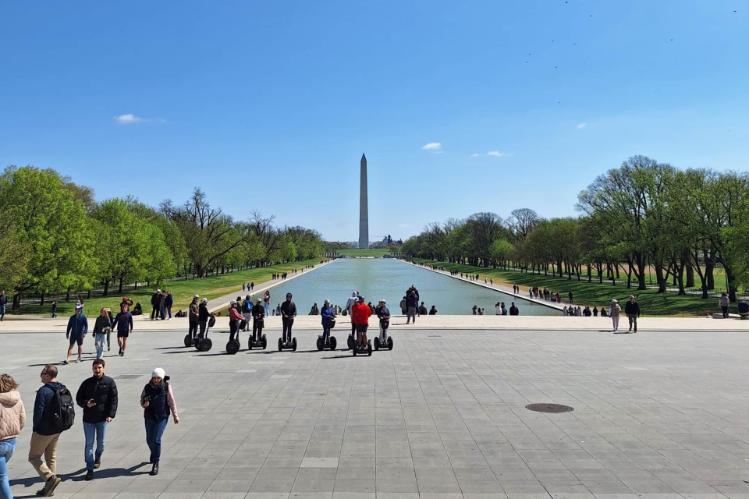
Dr Josh Gardner is a postdoctoral researcher in the Department of Pharmacology and Therapeutics. As the winner of the inaugural British Toxicology Society – ASPET Lecture Award, he recently travelled to the USA to deliver a guest lecture. Here he tells us about his extended trip.
I recently had the opportunity to travel to America as the inaugural winner of the BTS-ASPET Lecture Award, an exchange scheme between the British Toxicological Society (BTS) and the American Society of Pharmacology and Experimental Therapeutics (ASPET).
I received the Award for my research investigating drug allergies associated with cystic fibrosis therapies, which have drastically increased life expectancy since their introduction. It is crucial to improve our understanding of susceptibility to allergies, as severe adverse reactions can lead to patients stopping treatment.
As an early career researcher aiming to establish my own research niche and build independent collaborations, receiving the Award provided me with an invaluable experience, both personally and professionally. It enabled me to attend the ASPET 2025 Annual Meeting and deliver the BTS Guest Lecture as part of the Toxicology Division Symposium. I was also lucky enough to extend my trip to include visits to universities and institutions in the US to deliver additional seminars.
Visiting the US FDA
My first stop was Washington DC to spend a day at the US Food and Drug Administration (FDA) Headquarters in Silver Spring. I visited the Centre for Drug Evaluation and Research (CDER), which ensures that safe and effective drugs are available for the public. I received a warm welcome from my hosts, Dr Michael Norcross and Dr Montserrat Puig, whose research focuses of the underlying immunological mechanisms of drug hypersensitivity reactions to abacavir and flucloxacillin.
During my visit I gave two seminars, to the Immunology Centre of Excellence & Integrative Immunogenicity Working Group (IIWG) and to the Centre for Biologics Evaluation and Research (CBER). We also discussed current and future research as well as potential opportunities for collaboration.
I also managed to squeeze in a memorable day exploring the major landmarks of the downtown area, including a walk past the Capitol Building, The White House and the Lincoln Memorial.

ASPET 2025
Next up was the ASPET 2025 Annual Meeting in Portland, Oregon. It focused on key emerging trends in the fields of pharmacology and drug discovery. This included sessions on current research into GLP-1 receptor antagonists, repurposing of generic drugs and applications of artificial intelligence for next generation therapeutics research.
Highlights included hearing about new research programmes outlining how clinical pharmacology approaches are being used to optimise patient treatments. Networking was also on the agenda, including a welcome reception, daily poster mixer sessions and ASPET Divisional events. Throughout I enjoyed discussions on science and more with both junior and senior researchers.
I delivered the ASPET-BTS Guest Lecture in the Career Awards in Toxicology session, dedicated to recognising Toxicology Awardees. During my lecture, ‘Beyond HLA: Exploring the molecular mechanisms underpinning drug hypersensitivity reactions’, I discussed my research in the field of drug allergy, outlining how HLA genotype is just one predisposing factor for drug hypersensitivity. Other factors include cellular metabolism and inflammatory microenvironment.
Nashville
Following the ASPET meeting, I travelled to Nashville, Tennessee to visit Professor Elizabeth Phillips at Vanderbilt University. Professor Phillips is a specialist in infectious diseases, clinical pharmacology and drug safety. I took part in the Centre for Drug Safety and Immunology (CDSI)’s seminar series, which provides a platform for basic scientists and clinicians to discuss cutting-edge research that can significantly impact patient care. The seminar was also streamed online, allowing participation from collaborators and team members based at the Institute for Immunology and Infectious Diseases at Murdoch University.
I also attended meetings with Professor Phillips and her team, who have established a research and clinical programme in drug hypersensitivity. The programme specifically focuses on the tissue specificity, genetic basis and immunopathogenesis of severe T-cell mediated adverse drug reactions such as Stevens-Johnson Syndrome/Toxic Epidermal Necrolysis and drug reaction with eosinophilia and systemic symptoms.
It wouldn’t be a trip to Nashville without music so after my seminar I explored Broadway, famous for honky tonks and live country music. My personal highlight was visiting the Johnny Cash Museum, which houses the world's largest collection of Johnny Cash memorabilia and artefacts!
Overall, receiving the BTS-ASPET Lecture Award has been an incredibly rewarding experience that has significantly contributed to my development as an independent researcher. I’m grateful to have been afforded the opportunity to engage with leading scientists, share my research on an international platform, and build new collaborations. I’d like to thank both Professor Ian Copple (BTS) and Dr. Cheryl Rockwell (ASPET) for establishing and supporting this fantastic initiative for early career researchers.